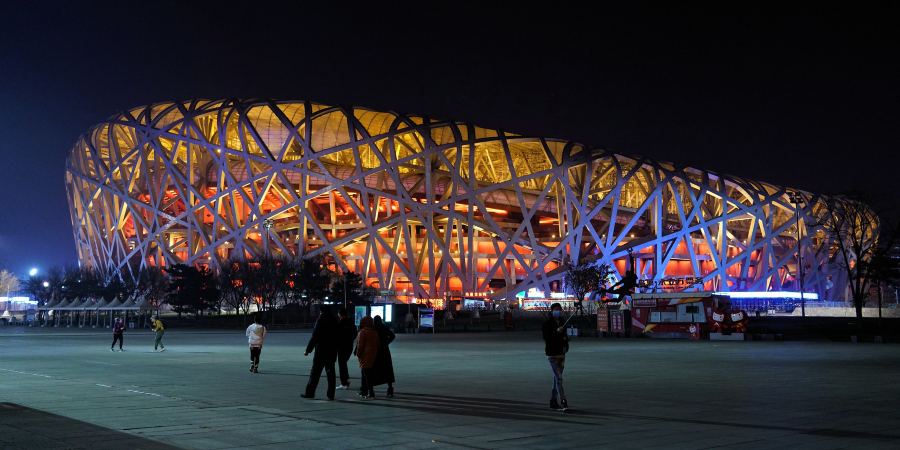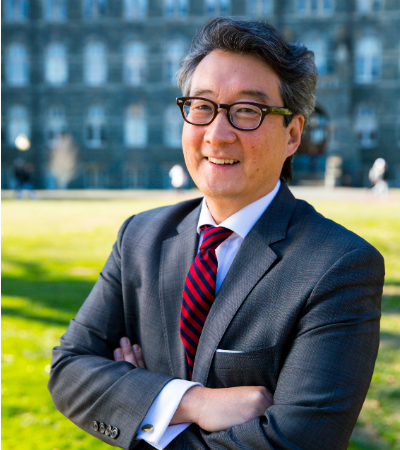What’s ‘Politicizing’ the 2022 Winter Olympics?
Chinese officials claim the U.S. diplomatic boycott is politicizing the games, but the Olympics have always been political.

Published by The Lawfare Institute
in Cooperation With

Editor’s Note: As the Olympics approach, the world is anticipating fierce competition among the world's best athletes and heartwarming and heartbreaking stories of the thrills of victory and the agonies of defeat. We should also anticipate politics. Victor Cha, of Georgetown University and the Center for Strategic and International Studies, details the long history of the politicization of the Olympics, as well as how China and the International Olympic Committee will try to dodge and counter political pressure.
Daniel Byman
***
Critics have called President Biden’s boycott of the 2022 Beijing Winter Olympics, scheduled to start this week, a “half-measure” that won’t reverse China’s human rights crackdowns. True as that may be, it leaves a stain on the Chinese Communist Party’s efforts to whitewash the games. However, Chinese officials may care less about Biden and more about the omicron variant and Russian machinations in Ukraine, which could complicate the best-laid plans of the Chinese hosts and the International Olympic Committee (IOC).
Boycotts and Bans
Biden is certainly not the first leader to boycott an Olympics. The history of the Olympics is replete with bans and boycotts. In 1980, the United States famously led a 66-nation boycott of the Moscow Olympics over the Soviet invasion of Afghanistan. In 1984, the Soviets retaliated with a 12-nation boycott of the Los Angeles games (China did not participate in the boycott and chose to compete). In 1976, 30 African nations boycotted the Montreal Olympics to protest participation by the New Zealand All Blacks rugby team following its tour of apartheid-era South Africa. Spain, the Netherlands and Switzerland withdrew in protest from the 1956 Olympics in Melbourne over the Soviet invasion of Hungary. Egypt, Iraq and Lebanon boycotted the same Olympics over the Suez crisis. China also pulled out of the 1956 games to protest Taiwan’s participation.
Countries have also been banned from the Olympics, as was the case in 1920 when Hungary, Germany, Austria, Bulgaria and Turkey were banned from the Antwerp games for their role as aggressors in World War I. Imperial Japan forfeited hosting the Olympics for the first time in 1940 amid international protests of its invasion of Manchuria, and it was not invited to participate in the 1948 London Olympics after World War II.
Biden’s boycott does not bar U.S. athletes from participating, which makes perfect sense. The Carter administration’s 1980 boycott crushed the Olympic dreams of U.S. athletes and penalized them for Soviet actions. To do the same this time would effectively sanction Team USA for Chinese human rights violations in Xinjiang.
Despite the European Parliament’s nonbinding resolution in July 2021 calling for diplomatic officials to boycott China’s Olympics over the human rights situation in Hong Kong, the Xinjiang Uyghur region, Tibet, and Inner Mongolia, not many governments, in Europe or elsewhere, are following suit. Britain, Australia and Canada have joined the U.S. boycott. Denmark, the Netherlands and Japan are not explaining their decisions to withhold official delegations to Beijing, insinuating the reasons could have to do with the coronavirus or could be in protest over human rights. South Korea, Germany, Italy and France have not followed the Biden boycott. The last two, probably because they are hosting the Olympics next (Paris in 2024 and Milano Cortina in 2026), may want to avoid retaliation by China, which has threatened that those who boycott “will pay a price for its erroneous actions.” Figure 1 traces the diplomatic boycotts announced since December 2021.
Figure 1. We’re not coming—countries boycotting the Beijing Olympics.
Politicizing Sport
A diplomatic boycott is a fairly low-cost, high-profile action that will leave a stain on Beijing’s stage. Countries usually send a high-level delegation of government officials, former Olympians, and other notables to pay respects to the host and as a show of patriotism. First Lady Jill Biden led the U.S. delegation to the delayed 2020 Tokyo Olympics, where she hung out with French President Emmaneul Macron and World Health Organization Director-General Tedros Adhanom Ghebreyesus at the opening ceremony, dined with the Japanese prime minister, and cheered on Team USA in women’s basketball, soccer and swimming. She even held a watch party with embassy staffers, creating all-around good vibes. Coronavirus restrictions made for sparse audiences, which made Biden’s presence in the stands a highlight for all of the athletes. First Lady Michelle Obama led the U.S. delegation to the 2012 London summer games, and President George W. Bush attended the 2008 Beijing summer games. None of this will happen in Beijing this month. Indeed, White House spokesperson Jen Psaki was explicit that the Biden administration did not want to do Beijing the favor of “contributing to the fanfare of the games.”
China responded angrily to Biden’s boycott, threatening that the United States will “pay a price” and accusing the United States of politicizing sports against the spirit of the Olympic charter. That charge drips with irony as China wins the gold medal when it comes to politicizing sport.
China boycotted the Summer Olympics effectively from the Finland games in 1952 until the 1984 Los Angeles games over its demands to exclude Taiwan’s participation. It restricted Chinese citizens from traveling to South Korea’s 2018 Pyeongchang Winter Olympics over a missile defense controversy. It sanctioned the NBA Houston Rockets in 2019 over a social media tweet by one of its staff supporting the democracy protests in Hong Kong. And it likely will carry out a retaliatory boycott of the Los Angeles 2028 Olympics (some Chinese newspapers have already advocated this), and possibly the 2032 games in Brisbane over Australia’s joining Biden’s boycott. There is no actor in world politics that has ignored the Olympic charter’s mandate to keep politics out of sports more than China, except perhaps the IOC itself when it justified keeping the 1936 games in Nazi Germany as insulating the Olympics from politics.
As much as the world would like the Olympics to be devoid of politics, as George Orwell once wrote, sport “is war minus the shooting.” When athletes compete wearing the colors of their nation, they evoke feelings of nationalism among the audience unlike any other form of art, music or literature. In this regard, the Biden boycott is a high-profile and political sanction, but ironically it depoliticizes the games by removing the presence of government officials there to démarche Chinese leaders or speak to the press.
IOC Versus WTA Over Peng Shuai
The Olympics juxtaposes the liberal tradition of sport—fair competition, transparency playing by the rules—with the illiberal practices of the regime in China. This provides an opportunity for the IOC and Olympic corporate sponsors to advocate for political change. Yet the IOC has put no such pressure on China. Upholding the mandate to depoliticize the Olympics, the IOC has basically worked with the Chinese to encourage some token concessions (e.g., allowing foreign journalists unfettered, but monitored internet access), but not much more. Questions about the human rights situations in Xinjiang—where China stands charged with incarceration, torture and mass sterilization of more than 1 million Uyghurs—meet with the rote IOC response that the games are not political.
The case of Peng Shuai illustrates the point. The Chinese Communist Party has not fully explained the disappearance of the Olympian and former world number one women’s doubles tennis star after her social media posts accusing former Vice-Premier Zhang Gaoli of sexual assault (her social media accounts have since been deleted). The World Tennis Association (WTA) announced the cancellation of all nine professional tennis tournaments in China, including in Hong Kong, until Peng is allowed to speak freely and her case of assault is investigated. This is a credible, costly and admirable signal by the WTA that costs hundreds of millions of dollars in one of tennis’s largest growing markets. The IOC’s head, Thomas Bach, by contrast, has been working feverishly to blow past the issue in the run-up to the games, holding staged calls with the Chinese tennis star to tamp down international uproar over her disappearance from public view, but no transcripts, videos or acknowledgment of her sexual assault claims are being provided.
Stuff Happens
Ultimately, the reason Chinese leaders may be less worried about the boycott is because they have seen this all before. No doubt they find it annoying, but they know that when illiberal regimes like themselves and Russia host the Olympics, they must run the gauntlet of Western protests. But they also know that once the games begin, the stories of gold-medal performances will dominate the media cycle and drown out the politics. That was the playbook in 2008, and China will stick to the same game plan.
Nevertheless, as much as Chinese hosts seek to choreograph a perfectly whitewashed Olympics, the history of the games has taught that “stuff happens.” For one, we shall see how China’s well-laid plans for the “closed-loop COVID-free bubble” of athletes, coaches and staff will survive first contact with the virus.
The athletes themselves present another variable. Despite every effort by the IOC to muzzle them, the fact that one of their own, a former three-time Olympian, is at the center of a controversy highlighting the abuses against free speech and gender rights in China, may hit deeply enough to motivate some athletes to speak out more broadly on behalf of the silenced voices in China.
Third, the Olympics never take place in a vacuum, and unforeseen events during those two weeks could undermine the best-laid plans. For example, in 2008 in the run-up to the Beijing summer games, tensions were building in South Ossetia between Russian-backed separatists and Georgia. This eventually led to Russia’s invasion of Georgia on the same day as the opening ceremonies. A Russian invasion of Ukraine, in particular, would shift world attention to Vladimir Putin and the course of the war. This could benefit Xi Jinping in that it would take world attention away from Xinjiang, Hong Kong, Tibet or Taiwan during China’s Olympics. Or, it could hurt the games because no one will pay attention to them.
The United States can do little to control these variables. For the Biden administration, the expectation was never that the boycott would change China’s human rights policies; however, Biden is succeeding in messaging that it’s not “business as usual” in the new competitive context of U.S.-China relations, and that he will not be complicit in a Chinese-made Potemkin platform on which to stage the Olympics.




